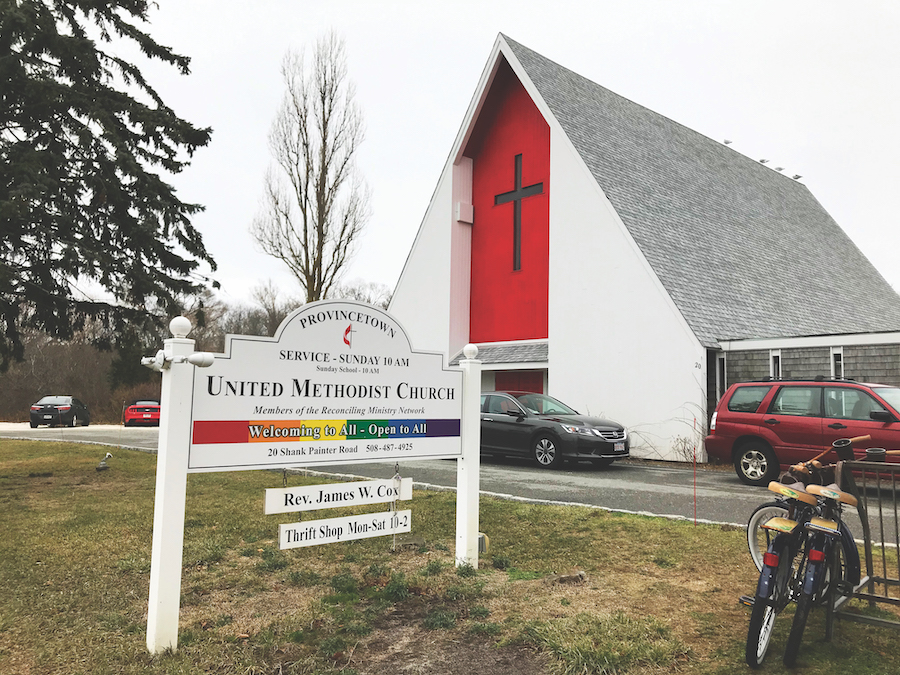After the General Conference of the United Methodist Church (UMC) in February 2019 upheld the so-called Traditional Plan, which affirms the church’s ban on hosting and officiating same-sex marriages and on ordaining LGBTQ clergy, I had planned, as a writer, to take a look at how Methodists on the Outer Cape, straight and gay, were coping with the decision.
Then, just as I set out to research that story last week, a group of 16 UMC leaders from around the world announced a proposal to split the church, the second largest mainstream Protestant denomination in the U.S., with an estimated 12 million members globally, allowing supporters of the Traditional Plan to leave the UMC, and for the UMC to finally overturn the bans on same-sex marriages and LGBTQ clergy. The proposal is to be voted on at an upcoming General Conference in May, and the leaders behind it expect it to be passed, because the split has widespread support from both progressives and conservatives within the church. It would solve a longstanding impasse. The details that had been negotiated were mostly financial.
This is good news. The split would mean that the UMC would join the Episcopal, Presbyterian, and Evangelical Lutheran churches; the Disciples of Christ, United Church of Christ, and Unitarian Universalist Association; and Conservative and Reform Judaism in removing the stain of homophobia and transphobia from its doctrine.
Mind you, the progressives — the opponents of the Traditional Plan — have never insisted that conservatives in the church be compelled to perform same-sex marriages or ordain LGBTQ clergy. All they sought was tolerance for either approach. As I see it, that is a compromise stance. It reminds me of the way slave states were appeased in the lead-up to the Civil War. The bigotry known as homophobia or transphobia is thus treated as a difference of opinion. But conservatives don’t see this as opinion: they see it as a dictate of scripture.
It’s hard to fathom nowadays how a church could support slavery, but the truth is that churches did. And scripture was used to justify it. Scripture is used to condemn a lot of things. Ironically, there is precious little in the Judeo-Christian Bible that even contemplates homosexuality. The infamous passage in Leviticus that labels gay sex an “abomination” (meaning unclean, nothing more) can be found amid rules for conducting animal sacrifices and other preposterously outdated prescriptions for pious living (which are followed today by no one). The gist of the passages in Sodom and Gomorrah so often cited to vilify gay sex are actually condemnations of sexual violence and the brutalization of vulnerable guests — that’s the perversion. A couple of New Testament passages simply echo the Old Testament’s. And that’s all, folks. The scripture’s oft-claimed “unambiguous” condemnation of homosexuality is almost entirely nonexistent.
Homophobes often claim to be full of love — “love the sinner, hate the sin.” Hogwash. Demonizing those who are different yet harmless is the sin. And churches have a lot to atone for.

I went to a sermon at the UMC in Provincetown last Sunday, and over the last week I spoke with local pastors and some in the congregation. Methodists on the Outer Cape are mostly progressive and actively welcome LGBTQ members and clergy and approve same-sex weddings. The late Jim Cox, who was pastor in Provincetown for many years, was, in fact, gay (though not formally out), and he officiated at same-sex weddings, though not in the church on Shank Painter Road. Among the local clergy who answered my calls — and who would speak only off the record — some were nervous that the General Conference in May might not approve the church split. To continue with homophobic national rulings would be a burden to them.
Growing up in an atheist household — my parents were Jews and scientists who raised my brother and me in the Ethical Culture Society, which espoused ethical humanism — it’s difficult for me to relate to LGBTQ people who continue to attend churches that officially condemn them. When I watched the documentary Trembling Before G-d, about ultraorthodox Jewish gays and lesbians who come out and are ostracized by their families and communities, and who grieve and desperately want to rejoin, I was mystified. I thought, just leave! Save yourself. My reaction was the same to stories of excommunicated Mormons. My husband is a lapsed Catholic, and I am at a loss to explain why anyone LGBTQ who was raised Catholic would still go to or support the church, given its bigoted dogma and hypocrisies. But there are those who do.
Listening to the beautiful sermon by the Rev. Sandra Junier on Sunday, about baptism, and watching the small congregation, mostly elderly, largely female, I did get a sense of what is so precious about their faith. “We acknowledge the diversity of God’s universe and open our hearts as Christ loved all,” proclaimed the flyer handed to me. “God is love,” I heard Methodists say over and over. Many in Provincetown and Wellfleet (the UMC in Eastham did not return my calls) work tirelessly to feed those who are in need and to help the homeless. If only the national church would reflect that transparent goodwill. No more pastors defrocked for being gay or marrying same-sex partners, I say. If God is love, let’s see some more respect for love of all kinds.



